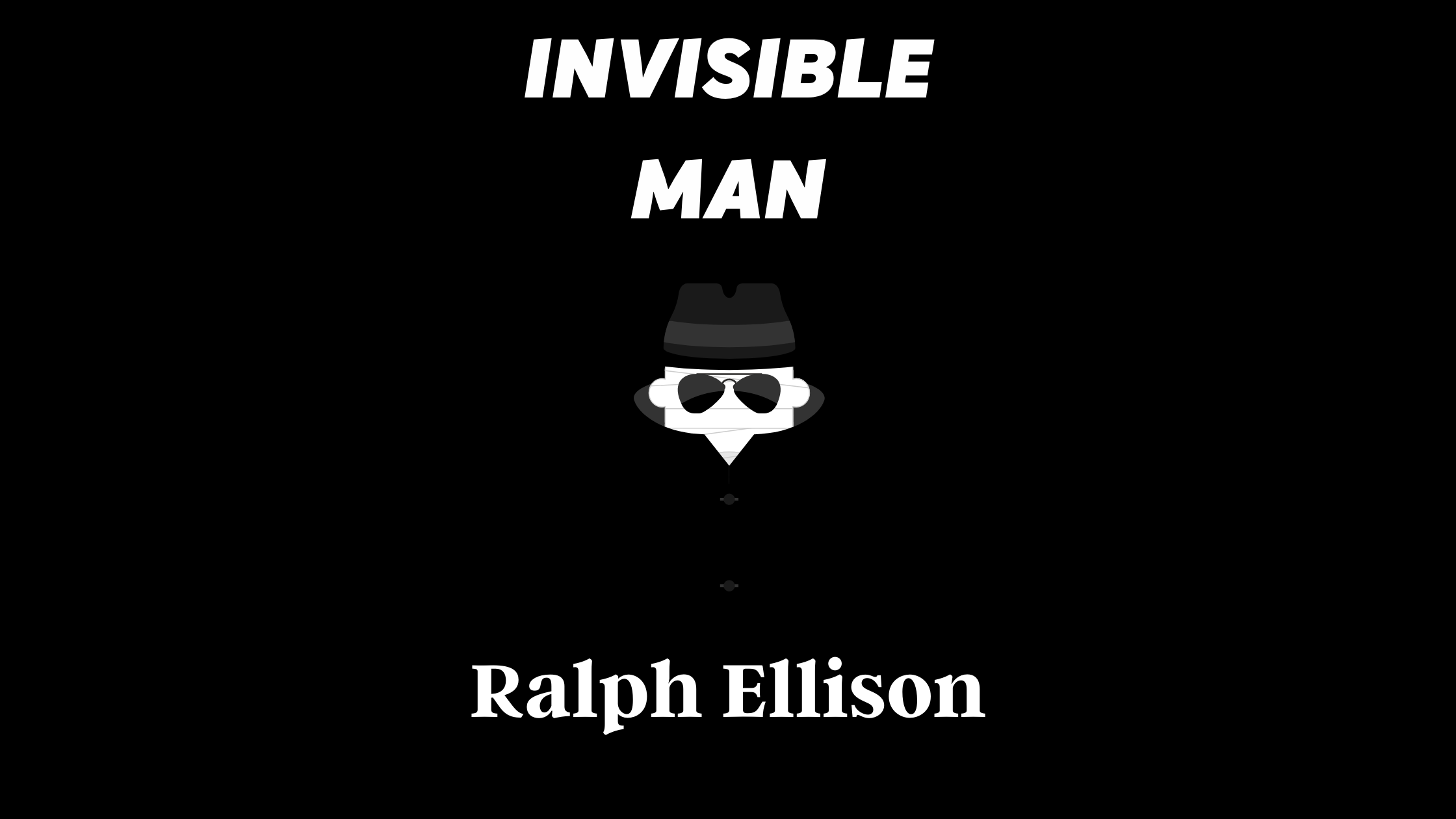This post will discuss the Plot Summary of Invisible Man By Ralph Ellison.
The book starts with the Narrator telling his story by claiming that they are an “invisible man.” His invisibility, he claims, is not due to physical limitations–he does not actually disappear but is instead the result of his inability to allow others to be seen by them. The Narrator claims that due to his invisibility, he has been hiding from society, living in a cave, and taking electricity at the Monopolated Light & Power Company. He has burned 1,369 light bulbs in a single session and listens to the music of Louis Armstrong’s “(What Did I Do to Be So) Black and Blue” on a Phonograph. He says he’s gone underground to tell the tale of his life and to hide from the world.
As a young man in the latter part of the 1920s or the early 1930s, the Narrator was a resident of the South. Because of his gift as a public speaker, he’s asked to deliver a speech to a group of prominent white people in his town. They give him the gift of a briefcase with the scholarship to a top Black college but only after humiliating him by requiring him to participate in a “battle royal” in which he will be pitted against younger Black men, blindfolded in a boxing arena. After the battle royal, white males force the young men to scurry across an electric rug to grab fake golds. The Narrator dreams that night, where he in imagines that his scholarship is a small piece of paper with a simple command to run.
Three years later, the Narrator has become a student at the school. He is tasked with driving the wealthiest white administrator of the school Mr. Norton, around the campus. Norton is constantly talking about his daughter and then takes an uninhibited interest in the story that tells the story of Jim Trueblood, an uneducated and poor black man who got his daughter pregnant. After hearing about this incident, Norton needs a drink, and the Narrator brings him to Golden Day, a saloon and brothel that typically serves Black men. There is a fight among a group of mentally unstable Black veterans who are at the bar, and Norton is able to escape during the chaos. He is taken care of by one of them, that claims to be a physician and mocks Norton along with the other Narrator about their ignorance of race relations.
On the campus, the Narrator is listening to an impassioned, long sermon delivered by Reverend Homer A. Barbee on the topic of the college’s founder who blind Barbee praises with poetic words. After the sermon, the Narrator gets dissuaded by the president of the college Dr. Bledsoe, who has been informed of the Narrator’s mishaps with Norton in the old slave quarters as well as the Golden Day. Bledsoe criticizes the Narrator telling him that he should have presented the white man with an idealized picture of Black life. The Narrator is expelled with seven letters of recommendation to the college’s trustees, who are white in New York City, and takes him to the city to look for employment.
The Narrator is transported to the bustle and bright lights of 1930s Harlem and is unable to secure a job. The letters given to him offer little help. Finally, the Narrator is summoned to an office belonging to one of the addresses, which is one of the trustees known as Mr. Emerson. Emerson’s son is there who reads the letter and informs the person who wrote it that he was betrayed.
The letters from Bledsoe show the Narrator as dishonest and untrustworthy. The young Emerson assists the Narrator in securing a job with a low salary for Liberty Paints. Liberty Paints plant, whose most popular shade has been named “Optic White.” The Narrator works as an employee of Lucius Brockway, the Black man who creates the white paint. However, Brockway suspects that he is involved in union activities and then turns against the Narrator. Both men fight, ignoring the process of making paint; as a result, one of the unsupervised tanks explodes, and the Narrator is unconscious.
The Narrator awakes in the hospital owned by the paint factory, being temporarily unable to remember his name and his ability to speak. The white doctors see the appearance of their unknown black patients as an opportunity to conduct electrical shock experiments. When the Narrator regains his memory and then leaves the hospital, he collapses on the street.
A few black community members accompany him to the house of Mary, an amiable woman who allows him to live with her at no cost in Harlem and helps him develop a sense of Black culture. A few days later, the Narrator is witness to the eviction from an old Black couple of the Harlem apartment. In front of the throng of people who are gathered in front of the building, he delivers an eloquent speech in opposition to the expulsion.
Brother Jack listens to his speech and gives him a job as spokesperson for the Brotherhood, which is a political group that claims to aid those who are socially marginalized. After initially refusing the job, the Narrator accepts the position to pay Mary to repay her kindness.
However, the Brotherhood insists that the Narrator get his new name, part ways with his past, and relocate to a brand new home. The Narrator is formally enrolled into the Brotherhood at a celebration in the Chthonian Hotel and is put in charge of pushing the goals of the organization in Harlem.
After being taught rhetoric by a white member of the group known as Brother Hambro, the Narrator travels to the branch he is assigned to in Harlem where he is introduced to the attractive, smart young blackhead tod Clifton. He also meets The Black nationist leader of Ras the exhorter who is opposed to a multiracial Brotherhood as well as believes Black Americans must fight for their rights above and against whites everywhere. The Narrator makes speeches and is an infamous name within the Brotherhood and is a fan of his work.
But one day, the Narrator receives a mysterious note telling him to be mindful of his position as a Black man within the Brotherhood. Soon after one of the Black Brotherhood members, Brother Wrestrum claims that the Narrator is seeking to utilize the Brotherhood to further his own desire to make a personal difference. As a committee, the Brotherhood examines the allegations and then assigns the Narrator a new position, which is to be an advocate for women’s rights. After delivering a speech in the evening, he’s charmed by a woman of white descent at the event; she tries to use him to fulfill her fantasies of sexual intimacy with Black men.
In a short period of time, after which the Brotherhood returns the Narrator to Harlem, and he finds that Clifton is gone. A number of other Black members have also left the organization, and the majority of the Harlem community believes it is the Brotherhood that has violated their rights. The Narrator spots Clifton selling on the street the dancing “Sambo” doll, dolls that invoke the image of the lazy, ostracized slave. Clifton is not able to obtain permission to sell his products on the street.
The police accost him with white officers and after a fight and shooting, he is killed as the Narrator, along with others watch. In his own initiative, the Narrator hosts the funeral of Clifton and delivers his speech, which presents his friend’s death as a hero, generating the public’s support for Clifton.
Clifton’s Brotherhood is furious at him for arranging the funeral without consent and Jack is harshly scolding the Narrator. While Jack complains about the Brotherhood’s stance on ideology the glass eye drops out of one of his eye sockets. The Brotherhood is able to send the Narrator back to Brother Hambro to learn about the new tactics of the organization in Harlem.
The Narrator leaves feeling angry and eager to get revenge against Jack along with the Brotherhood. Arriving in Harlem and finds the community immersed in a constant squabble over race relations. Ras is able to confront him complaining about the Brotherhood’s inability to capitalize on the momentum that was generated by the funeral of Clifton. Ras has his men attack the Narrator and the Narrator has to dress in dark glasses and a cap. With his dark glasses, street people believe that he is Rinehart who is believed to be a bookie, pimp or lover, as well as reverence at the same time.
The Narrator visits Hambro’s home and there, Brother Hambro informs him that the Brotherhood has decided not to promote Harlem as well as its Black movement. Hambro mocks people, saying that they are just tools and the concerns that are the interests of Brother Hambro and the Brotherhood have more importance than the individual interests of any. In remembrance of his grandfather’s advice to him his late grandfather, the storyteller decides to destabilize the Brotherhood by appearing to be to their side completely. He decides to seduce and flatter an acquaintance of one of the leaders to get secrets about the Brotherhood.
However, the woman he picks, Sybil, does not know anything about the Brotherhood and tries to make use of the Narrator in order to satisfy her dream of being victimized by the Black man. As she is in the same room at home with Sybil at home the Narrator is contacted by an urgent call from Sybil, informing him that he must go to Harlem promptly. The Narrator can hear the sound of glass breaking and then the call ceases to exist. The Narrator arrives in Harlem and finds the area with an all-out riot, which is discovered to have been sparked by Ras.
The Narrator is involved in the setting of a tenement fire. After escaping from the scene of the fire, he meets Ras dressed as an African chieftain. Ras demands that the Narrator be executed. The Narrator escapes but is confronted by two police officers who suspect that the briefcase is stuffed with loot from the violence. To escape the policemen, the Narrator falls into an unmarked manhole. The police ridicule him and place a manhole’s cover.
The storyteller says that he’s remained underground throughout the years. The end of his story is the beginning. He says that he realizes that he needs to respect his own uniqueness and stay loyal to his persona without losing his commitment towards the society. He claims that he is ready to come out of the underground.



